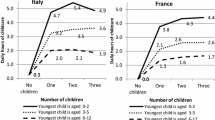Abstract
This article attempts to estimate the time cost of children in France for couples who do not forgo any income, on the basis of the INSEE 1998–1999 time use survey. Having a child involves an increase in domestic work and/or the dedication of occupational income to pay for childcare. The reduction in “time for oneself”—leisure and personal care, i.e. 24 h less working hours paid or unpaid—is modelled for a dual-earner couple in full-time employment who do not use childcare services to increase his/her leisure time. Taking a couple in full-time employment avoids income endogeneity bias, since income is reduced by career interruption and part-time employment. These estimates account for this selection by full-time paid work. The article shows that time cost is roughly 1 h 30 min a day for a child aged 3–14, and is 4 h a day for each younger child. As this cost rises, the more fathers sacrifice some of their free time. The father and mother of two young children with a childminder thus each have only 11 hours of free time (including sleep) per day. The time cost of a large family (3 children) is equivalent to a full-time job on the labour market. In France, work-life balance policies and family pension entitlements only cover a small part of this cost.
Similar content being viewed by others
References
Anxo, D., Flood, L., & Kocoglu, Y. (2002). Offre de travail et répartition des activités domestiques et parentales au sein du couple: une comparaison entre la France et la Suède. Economie et Statistique, 352(353), 127–150.
Brousse, C. (1999). La Répartition du Travail Domestique entre Conjoints, Permanences et Evolutions entre 1986 et 1999. Paris: France, portrait social, Insee.
Craig, L., & Bittman, M. (2008). The incremental time costs of children: An analysis of children’s impact on adult time use in Australia. Feminist Economics, 14(2), 59–88.
Ekert-Jaffé, O. (2009). The time cost of children: Time-budget constraints and women’s professional work. Paris: Documents de travail, 163, INED.
Gustafsson, B., & Kjulin, U. (1994). Time use in child care and housework and the total cost of children. Journal of Population Economics, 7, 287–300.
Sousa-Poza, A., Schmid, H., & Widmer, R. (2001). The allocation and value of time assigned to housework and child-care: An analysis for Switzerland. Journal of Population Economics, 4, 599–618.
Author information
Authors and Affiliations
Corresponding author
Rights and permissions
About this article
Cite this article
Ekert-Jaffé, O. Are the Real Time Costs of Children Equally Shared by Mothers and Fathers?. Soc Indic Res 101, 243–247 (2011). https://doi.org/10.1007/s11205-010-9642-3
Accepted:
Published:
Issue Date:
DOI: https://doi.org/10.1007/s11205-010-9642-3




